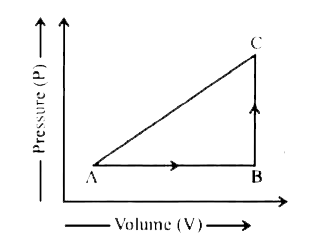110 J of heat is added to a gaseous system, whose internal energy change is 40 j. then the amount of external work done is
140 J
70 J
110 J
150 J
The correct Answer is:B
Quantity of heat supplied to system is equal to increase in internal energy and external work.
According to first law of thermodynamics , when some quantity of heat (dQ) is supplied to a system capable of doing external work, then the quanitity of heat absorbed by the system (dQ) is equal to sume of the increases in the internal energy of the system (dU) due to rise in temperature and the external work done by the system (dW) in expansion , i.e . dQ=dU+dW
When a gas expands , work done by the gas, dW, is taken as positive , when a gas is compressed , work is done on the gas, dW is taken as negative.
ΔW=ΔQ−ΔU
=110-40=70
Topper's Solved these Questions
- KINETIC THEORY OF GASES ANDRADIATIONBOOK - MHTCET PREVIOUS YEAR PAPERS AND PRACTICE PAPERSCHAPTER - KINETIC THEORY OF GASES ANDRADIATIONEXERCISE - Exercise 2
50 Videos
- INTERFERENCE AND DIFFRACTION OF LIGHT BOOK - MHTCET PREVIOUS YEAR PAPERS AND PRACTICE PAPERSCHAPTER - INTERFERENCE AND DIFFRACTION OF LIGHT EXERCISE - MHT CET Corner
24 Videos
- MAGNETIC EFFECT OF ELECTRIC CURRENTBOOK - MHTCET PREVIOUS YEAR PAPERS AND PRACTICE PAPERSCHAPTER - MAGNETIC EFFECT OF ELECTRIC CURRENTEXERCISE - MHT CET CORNER
20 Videos
Similar Questions
Knowledge Check
If 2 kcal, of heat is supplied to a system cause to change the internal energy of a gas is 5030 J, and external work done is 3350 J, then what is mechanical equivalent of heat?
A41.90 J/kcalB4190 J/calC4.19 J/kcalD4.19 J/calIf 150 J of heat is added to a system and the work done by the system is 110 j. then change in internal energy wil be
A260jB150jC110jD40jIn thermodynamic process, pressure of a fixed mass of a gas is changes in such a manner that the gas molecules gives out 20 J of heat and 10 J of work is done in the gas. If the initial internal energy of the gas was 40 J, then the final internal energy will be
A30 JB20 JC60 JD40 J
The P - V diagram of a system undergoing thermodynamic changes is as shown in the figure. The work done by the system in going from A→B→C is 30 J. If 68 J of heat is given to the system, then the change in the internal energy of the system between A and C is

View SolutionA diatomic gas is heated at constant pressure. If 105J of heat is given to the gas, find (a) the change in internal energy of the gas (b) the work done by the gas.
View SolutionFor a gaseous system find change in internal energy if the heat supplied to the system is 50 J and work done by the system is 16 J.
View SolutionIn a thermodynamic process, pressure of a fixed mass of a gas is changed in such a manner that the gas release 20J of heat and 8J of work is done on the gas. If initial internal energy of the gas was 30J, what will be the final internal energy?
View SolutionIn a thermodynamic process, pressure of a fixed mass of a gas is changed in such a manner that the gas release 20J of heat and 8J of work is done on the gas. If initial internal energy of the gas was 30J, what will be the final internal energy?
View Solution
